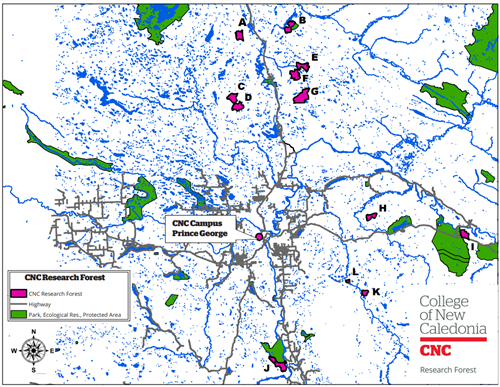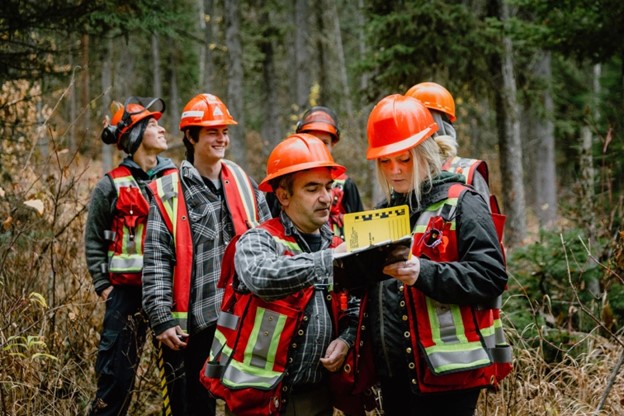The CNC Research Forest is grateful for the educational and research opportunities provided by the lands and resources within the traditional territories of the Tse'khene peoples of McLeod Lake Indian Band, Lheidli T'enneh First Nation, Nazko First Nation and the nations of Treaty 8 territory including West Moberly First Nations, Halfway River First Nation, and Doig River First Nation.
CNC’s Applied Research team spends about 90 percent of their summer in remote forest areas around Prince George setting up and assessing various research sites. Planting fungi, creating wildlife corridors, monitoring beaver ponds, mapping vegetation, restoring logging roads and streams… it’s a quick snapshot of the day-to-day work that goes into creating a local and resilient forest ecosystem.
CNC employees recently went on an off-road tour to the Research Forest on the southwest portion of the Treaty 8 lands of the Tse’Khene Peoples to see for themselves the variety of research done within the College to help ensure healthy forests for future generations.
“Taking CNC’s employees on a tour of the Research Forest was a fantastic opportunity to showcase this amazing resource within the College,” says Shelby Roberts, Research Associate. “Workplace learning is so important at the College so employees can continue to offer the best experience possible to students.
There are employees even within CNC who had no idea the College has a research forest that actively supports Natural Resources and Forest Technology students and local forestry research. By taking CNC employees out to the Research Forest, I hope that we inspired them to tell current and future students about the educational and career opportunities they can gain hands-on experience in through the Research Forest."
Providing value beyond the classroom
The Research Forest is comprised of 12 units of provincial forest land totaling approximately 12,500 hectares, all of which are located within 100 km of Prince George.

The Forest area was entrusted to CNC in 2009 as a critical resource and outdoor lab to support and enrich student education via the College’s Natural Resources and Forest Technology program. In this nationally accredited program, students study a core of forest technology courses enhanced by studies of wildlife and fish habitats, bird identification, Indigenous plants, First Nations stewardship principles, and Earth science.

Since its inception, the Forest has proved to provide value beyond experiential student learning and research opportunities. With the continuous operations of the CNC Research Forest office, CNC also offers temporary work experience opportunities for students; supports wide-ranging forestry and research operations in the region; and fosters working partnerships with the natural resources and forestry sector, government, First Nations, and other forest research groups.
Supporting community projects
Beyond providing management oversight to the Research Forest, the independent CNC Research Forest Society also supports novel environmentally-focused projects in the greater communities that the CNC serves (Burns Lake, Fort St. James, Mackenzie, Prince George, McBride, Quesnel and Vanderhoof).
Launched in 2019, the
CNCRFS Legacy Fund has provided $290,000 to individuals and organizations in Northcentral British Columbia. Successful applicants have received up to $50,000 to continue their work sustaining and revitalizing local natural resources for the environmental and/or social benefit to people living in the CNC service region.
Last year, the Legacy Fund provided $100,000 to support the creative and collaborative community projects submitted by School District 91 (Nechako Lakes) and the Stellat’en First Nation for
building an educational trail system and developing a forest rehabilitation plan.
Harvesting research data
The natural resources sector and forestry-dependent communities in Northern B.C. are facing a variety of environmental, economic, and social changes.
Various
Research Forest projects look to address those challenges through innovations in forest practices and improvements in ecosystem stewardship knowledge for the benefit of secondary education, the natural resources and forestry industries and all regional communities.
With autumn known as the harvest season, the Applied Research team expects to have preliminary results on their 2024 research projects and showcase the fruits of their hard labour in the fall of this year.
Learn more about CNC’s Natural Resources and Forest Technology program
Read more about the program, admission requirements, and learn how to apply
https://cnc.bc.ca/programs-courses/programs/detail/natural-resources-and-forest-technology